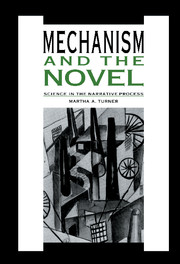Book contents
- Frontmatter
- Contents
- Acknowledgments
- 1 Introduction
- 2 The concept of mechanism
- 3 The Aristotelian logic of settlement in Austen's Pride and Prejudice
- 4 Scott's The Bride of Lammermoor: empiricism, mechanism, imagination
- 5 Cosmology and chaos in Dickens's Bleak House
- 6 Scientific humanism and the Comic Spirit: from The Ordeal of Richard Feverel to The Egoist
- 7 Old mindsets and new world-music in Conrad's The Secret Agent
- 8 Women in Love: beyond fulfillment
- 9 The mechanistic legacy: Lessing's Canopus in Argos: Archives
- Notes
- Bibliography
- Index
6 - Scientific humanism and the Comic Spirit: from The Ordeal of Richard Feverel to The Egoist
Published online by Cambridge University Press: 19 January 2010
- Frontmatter
- Contents
- Acknowledgments
- 1 Introduction
- 2 The concept of mechanism
- 3 The Aristotelian logic of settlement in Austen's Pride and Prejudice
- 4 Scott's The Bride of Lammermoor: empiricism, mechanism, imagination
- 5 Cosmology and chaos in Dickens's Bleak House
- 6 Scientific humanism and the Comic Spirit: from The Ordeal of Richard Feverel to The Egoist
- 7 Old mindsets and new world-music in Conrad's The Secret Agent
- 8 Women in Love: beyond fulfillment
- 9 The mechanistic legacy: Lessing's Canopus in Argos: Archives
- Notes
- Bibliography
- Index
Summary
The crumbling of the Natural Theology paradigm – prefigured by Dickens's inability in Bleak House to make Esther Summerson's worldview morally and epistemologically convincing – was made explicit with the 1859 publication of Darwin's Origin of Species. But while it supplanted the mechanistic model in one sense, Darwin's theory reified it in another: Darwin's version of the mechanistic worldview still relied on empirical observation and induction to detect underlying regularities among apparently diverse phenomena and explained these regularities in terms of universal laws or principles of behavior. The notion that the world is knowable and orderly but much more complex than previously imagined makes itself felt in novels of the late Victorian era in a number of ways. The Victorian preoccupation with the concept of “ the gentleman” takes on a new urgency in the 1860s and 1870s, for instance. For Dickens the question of gentlemanliness seems to center on the issue of good private citizenship. David Copperfield legitimizes his claim to be considered a gentleman when he becomes able to exercise good judgment regarding personal commitments – to live within his means and attend to the needs of his friends and family. Failure to live up to these standards causes much personal anguish and family hardship (as in the Micawbers' case) but poses little direct threat to the well-being of larger social units. By contrast, the consequences of failure to do one's duty are much broader in works like George Eliot's Middlemarch and George Meredith's Beauchamp's Career.
- Type
- Chapter
- Information
- Mechanism and the NovelScience in the Narrative Process, pp. 99 - 118Publisher: Cambridge University PressPrint publication year: 1993

